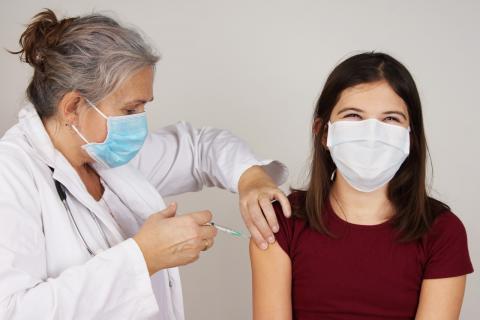Reactions: suggest monitoring side-effects of RSV vaccines associated with preterm births
A journal article published in the BMJ discusses the potential adverse effects associated with GSK and Pfizer's RSV vaccines in the face of a possible increase in preterm births and argues for further study of the risks and benefits of the drug.

Christopher Chiu - VRS EN
Christopher Chiu
Professor of Infectious Diseases, Imperial College London
While it is right that the safety of new vaccines must be given the highest priority, the response to this BMJ News Analysis should be measured. While the Pfizer and GSK RSV vaccines are based on similar technologies, they are not the same and the clinical trials were done at different times in different populations. It therefore should not be assumed that issues with one automatically equate to the same problems with the other. Until clearer information comes out about the potential confounding effects, for example, of uptake of other vaccines by women in the GSK study, it remains possible that the safety signal was not due to the vaccine itself but other uncontrolled factors.
“RSV is a major global problem in newborns and, to maximise prevention, it is important that safe maternal vaccination be available as an alternative strategy to directly giving babies antibody injections. Nevertheless, I completely agree that it will be essential for close monitoring to take place if the Pfizer vaccine is approved and taken up by larger numbers of pregnant women than could be assessed in the trials.
“I sit on the JCVI RSV subcommittee but have no other declarations.”
Stephen Evans - VRS EN
Stephen Evans
Emeritus Professor of Pharmacoepidemiology, London School of Hygiene & Tropical Medicine
We can make two mistakes in relation to decisions about harms that may be caused by a vaccine: concluding there is a harm and not using the vaccine when its benefits in certain situations outweigh the harms, and failing to conclude that a harm is real when the vaccine causes the problem. The latter problem is almost always there because effects that are uncertain of their cause are very rare. Hence the trials are often not sufficiently large to provide convincing evidence of exclusion of real but rare effects. Relying on findings being “not statistically significant” as the basis for exclusion is unwise as is made clear in the BMJ article.
The possibility that the Pfizer RSV vaccine might induce delivery earlier than it would have otherwise happened, cannot be excluded and this must be examined very carefully. Earlier delivery would lead to lower birthweight. Using single point cut-offs for prematurity or birthweight is not the most powerful statistical approach (as used in the trial publications) and before using the vaccine routinely it would be important to re-analyse the data using continuous measures, as implied in the quote in the BMJ article from a scientist at the US NIH.
“At the same time, even if the vaccine resulted in earlier delivery, this does not mean it should not be used in all circumstances. The balance of benefit and harm is determined by the extent and consequences of RSV disease. It would be a tragedy for children in resource-poor settings to be deprived of a vaccine that reduced mortality and severe illness when its adverse effects in that context are smaller. The balance of benefit and harm is not a universal property of the vaccine; it depends on the context of its use. What is also clear, as stated by Fred Zepp quoted in the BMJ article, it is vital that very careful monitoring of the vaccine in use in practice would be necessary to see what the magnitude of any effect on prematurity might be.
“The BMJ news piece raises reasonable questions but does not adequately explain the need to examine benefit and possible harm from a global perspective. It is vital to take the whole world’s needs into account when making assessments in this area.
“I am Emeritus at LSHTM and no longer funded. Until recently I was funded (one day per week) by LSHTM. They get funding from various companies, including Astra Zeneca and GSK but I was not funded by them, I have had no involvement in obtaining funding from them and I was not an investigator on any grants obtained from them. I am the statistician to the ‘meta-Data Safety and Monitoring Board’ for CEPI. I am paid for my attendance at those meetings and will be paid expenses for travel if that occurs. I am a participant in the Oxford/Astra Zeneca Covid vaccine trial, and on 13th January 2021 learnt I had received the active vaccine.”
Hristio Boytchev
- Comment
- Peer reviewed



